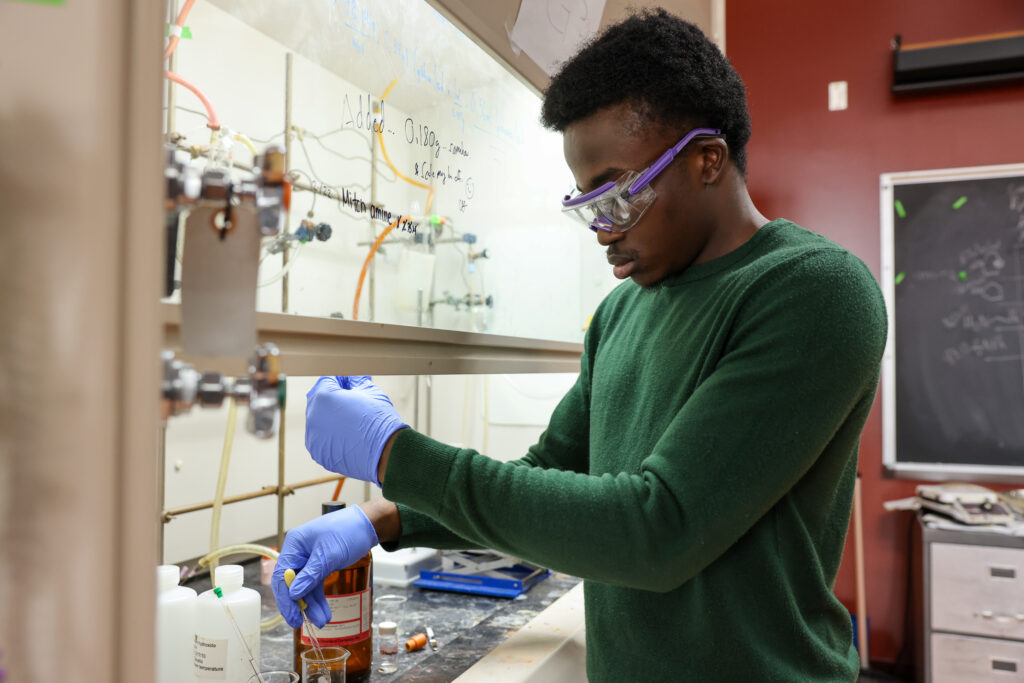Broadening minority participation and retention in STEM disciplines
Related Posts
Connect With Us
December 31, 2024
Whether it’s attracting minority applicants into science, technology, engineering, and math (STEM) disciplines or retaining them once enrolled, these have proven to be difficult tasks for colleges and universities across the country.
Albion College is no different.
“The retention number of all students in the STEM areas has been dropping in recent years,” noted Vanessa McCaffrey, Albion’s assistant provost and a professor in the Department of Chemistry and Biochemistry. “As the demographics of Albion College have changed and the number of students of color have dramatically increased over the past ten years, the problem with retention in STEM has become even more noticeable.”
Albion is attempting to address the issue in several ways. Perhaps the most prominent way has been using Title III funds to send STEM faculty and administrators to workshops conducted by the Washington, D.C.-based American Association of Colleges and Universities (AAC&U) TIDES Institute, which are designed to help STEM faculty and administrators understand the root causes of minority group underrepresentation and how they can address them. About 20 Albion faculty members have attended the summer workshops.
“It is a chance to reflect on the unique barriers and problems that the Albion College STEM departments face when it comes to retention and persistence of minority groups,” McCaffrey said. “During the three-day workshop, we heard from experts in belonging–but not just belonging as it relates to the STEM fields. It was a broader exploration and deep dive into the root causes of racism in higher education.”
Darren Mason, a professor in Albion’s Department of Mathematics and Computer Science, attended the TIDES conference in both 2023 and 2024. He said the conferences were quite valuable in helping him learn strategies to help minority STEM students succeed at Albion.
“In addition to general presentations about various forms of racism and their impact on the lives and learning experiences of marginalized communities, each year groups of STEM faculty members from Albion were able work 1-on-1 with an expert facilitator provided by the conference,” Mason said. “This person directly helped the Albion faculty focus their efforts to identify their own personal biases, list college-wide and discipline-specific challenges to student success/retention, and formulate specific strategies to improve both circumstances at the college.”

Albion College is actively working to retain more minority students in STEM disciplines.
He said a common theme during the TIDES discussions was the need to normalize for students the acts of “getting help” and “talking science” on a daily basis.
“Speaking for myself as a first-gen student, I essentially lived at [the extra-hour office hours] in college, constantly asking my professors for help, guidance, and support,” Mason said. “But I had to really work at getting such support. It should not be that hard. Getting help should be the norm and not stigmatized.”
“These discussions led to a variety of ideas, with one immediate, visible, and concrete outcome being the creation this semester of ‘group STEM student hours’ for all students at Albion,” he said. “This new service, which occurs in the Science Atrium every Monday from 2 to 3 p.m., is staffed by a collection of STEM faculty including myself, a very friendly emotional support animal (an adorable dog), and snacks. The goal is to create a visible-and-welcoming environment where students feel comfortable hanging out and talking about anything – life, food, fun, homework, life plans, etc. – with faculty and each other.”
In addition to workshop attendance, Albion recently conducted a climate survey in STEM to gauge student levels of feeling valued and supported.